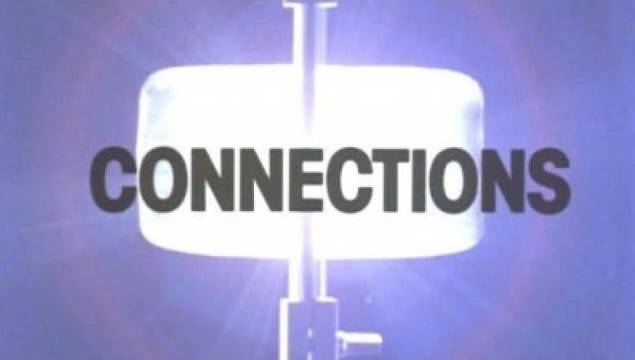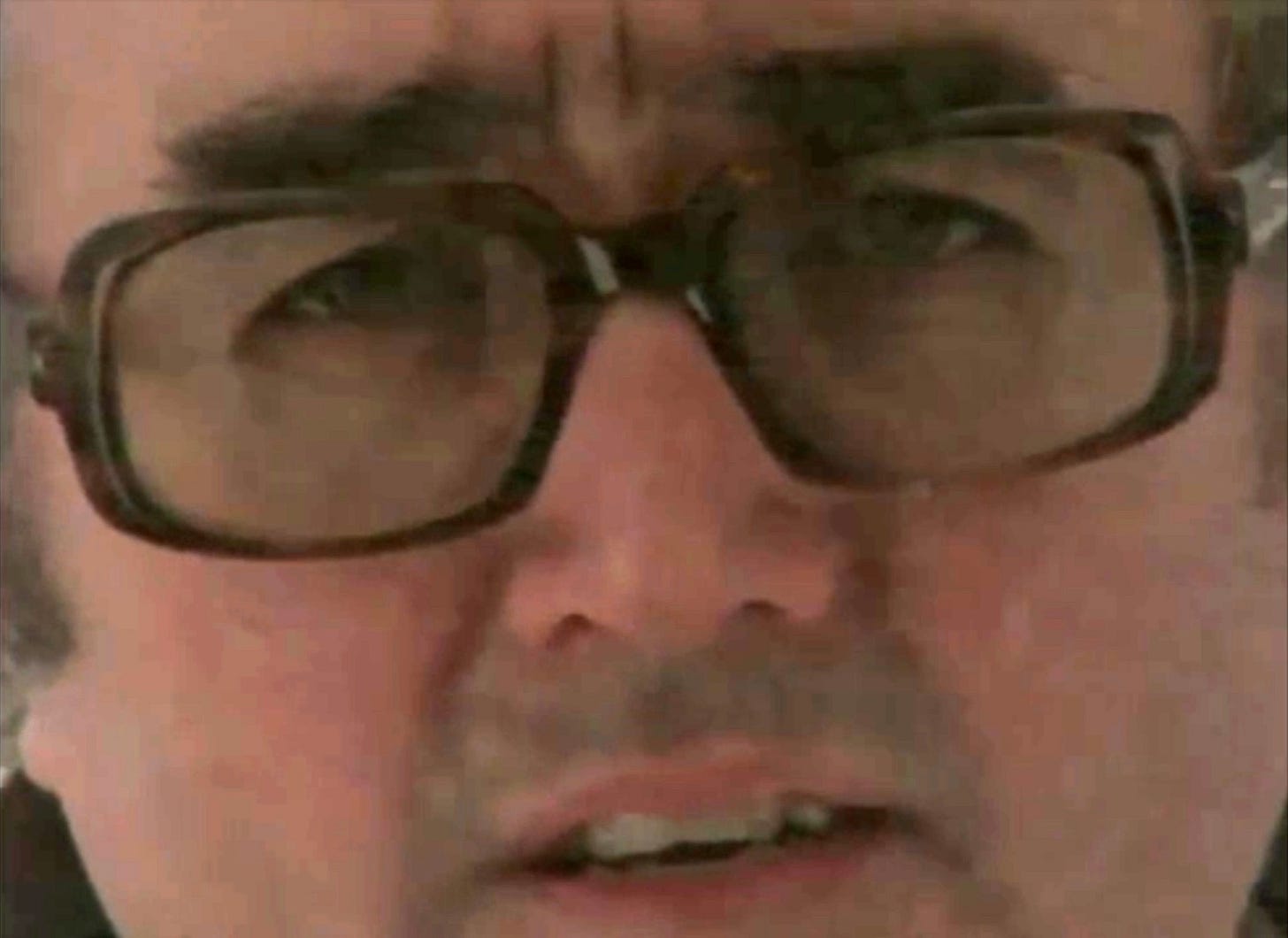The Trigger Effect
James Burke's vision of a suddenly un-connected world
I have vague memories of seeing episodes of James Burke’s CONNECTIONS show on television as a child, which must have meant it was in syndication for a long while as it was produced and aired by the BBC in 1978, and I would have seen it a decade or so later. But I remember it quite fondly, and I know from conversations with other people of my own age that many others do as well.
The premise of the show is that history, especially the history of technology, can be thought of as a series of unusual “connections,” where something that happens in one place or time leads to something else happening in another place or time.
It’s a very fun premise for a show. The essence of its model of history — that everything is connected through time, that history moves in unexpected directions — is better than a lot of alternatives out there, even if it is incomplete in many ways. But I appreciate its willingness to try and cover a pretty wide spectrum of time and ideas. (My friend Latif Nasser did a riff on it in his own Netflix show, CONNECTED, in 2020. You can watch me sweating through the New Mexico heat in Episode 6, “Nukes.” And I just now realized that Burke has made something of an update to the series as recently as 2023.)
The first full episode of the series was called “The Trigger Effect,” and I was once assigned to watch this in a course on the history of technology when I was an undergraduate. I’ve since had many courses of students of my own watch it, because it’s pretty interesting. The basic premise is taken from a real event, one of the several times in which New York City suffered a catastrophic power loss in the 1970s. What happens, Burke asks, when the electricity goes out in a modern environment? And what happens when it doesn’t come back on again? And what would happen if it never came back on again? And what does this tell us about the nature of modern civilization and its dependency on technology?
Below is an edit I’ve made of the episode that is about 30 minutes long. I’ve trimmed out some bit at the beginning and end that is plugging the rest of the series, and a longish-interlude that I don’t think is necessary for my purposes here. It’s worth the watch. My commentary on it will follow, but you should watch it first.
So there is an obvious cut that I made which trims out his discussion about the origins of agriculture and “civilization” (from the Fertile Crescent to Ancient Egypt). His ultimate argument thus evolves a bit into the idea that if you pull the rug out on electricity in particular, you end up having to go very far “back” technologically to “restart” the whole process.
Whether that’s true or not in a strict sense is, of course, debatable. But it’s still a fun idea — that what we call “civilization” is maintained by a technological infrastructure that is vast, often invisible to us, but perhaps more brittle than we’d like to believe.
The question of how brittle is our modern technological civilization is the question of how much resilience there is — how adaptable is our system to sudden shocks, failures, collapses, and so on. It was impressive to me to see how much COVID revealed about how brittle our logistical systems were, for example; that market forces had created a system that was arguably a lot less resilient than it had been a few decades prior.
I get a lot of pleasure showing this to undergraduates. It’s provocative and always generates interesting discussions. I think the very of its time aspects of it make it easier for them to see it as something that can be engaged with and critiqued (as opposed to something with a more “modern” and “slick” aesthetic). Burke’s basic argument, that people living in technologically-based civilization subject themselves to a “technology trap” constantly — because our way of life is entirely dependent on the functioning of large, complex, and fallible technology systems — is often quite surprising, yet clearly true to some degree, to people who have not as of yet considered it.
One can take issue with some of his generalizations, like about what happens if the technology suddenly fails:
But what happens when the effects become widespread, irreversible, devastating? What happens when what little resources you have to help you cope… give up? Then what?
Well, in all the disaster scenarios you read, what happens is that without power, technologically-based civilization cracks up rapidly. Without enough auxiliary power, and most major cities don’t have it, organization is impossible. It’s every man for himself. Looting and arson follow. And in a city not prepared to be a fortress, supplies run out.
I think two words in above are doing a lot of rhetorical “work.” First is “disaster scenario,” by which I think he means something between “speculative predictions” and “speculative fiction” about how people would respond to this kind of disaster (whether we call them “predictions” or “fictions” is something to dwell on by itself). Because he’s not describing something that we have records of actually happening, and that’s because he has slipped in another condition to this scenario. And that’s hidden in the other word doing a lot of work here: “irreversible.”
The chief example he gives in the clip, the New York City blackout, was not irreversible. Obviously. The whole premise falls apart if you take that word out of his scenario. Which gets us back to the question of resilience, again. If the power comes back on in a few hours, it’s mostly an irritation. If it never comes on, that’s what feels like some kind of apocalypse and “reset.”
And it’s worth pointing out explicitly that basing any broader theory of technology and civilization around the specific conditions of New York City in the 1970s is… an interesting choice. We don’t have to dwell on it, but it’s clear that New York in the ‘70s was a pretty specific context, with aspects both good and terrible.1 One similarly can’t really base conclusions on what people might do in the aftermath of nuclear explosion entirely on the cases of Hiroshima and Nagasaki — those are very specific places, peoples, and times.
But putting that aside, the transition he makes from high-minded discussion of technological society to post-apocalyptic survival narrative is both smooth and effective:
So, sooner or later, exhausted and desperate, you may have to make the decision to give up and die. Or to make somebody else give up and die because they won’t accept you in their home voluntarily. And what, in your comfortable urban life, has ever prepared you for that decision?
Repositioning the narrative from the perspective of the viewer is a really great rhetorical move, here, especially in such a gripping (if well-worn) way. That he can then step back from this horror story and transition to a discussion about the development of agriculture in Mesopotamia is, well, kind of brilliant. It works.
What I like about this clip isn’t so much that I think it’s accurate. It rests on too many assumptions about human behavior, and too many arbitrary and potentially implausible assumptions about the “disaster scenario,” to make its point, for example. And its model of the relationship between technology and society doesn’t quite give society as much credit as it really deserves; the semi-catastrophic results after the New York City blackout were arguably much more the result of social conditions than technological ones.
But, the clip is still is wonderfully provocative, and a really fun example of tying together what might appear to be very different domains of thought, like ancient history and social reactions to infrastructure failures, in the service of encouraging deeper thought about what it means to live in a civilization such as our own. Students tend to want to argue about it, and that’s sort of the point of showing it, right? But even I enjoy arguing with myself about it.
For an indulgently-nostalgic and myth-perpetuating take on this, NY77: The Coolest Year in Hell (2007) is a really fun watch. I admit that as a transplant who has lived NYC-adjacent for the last decade, I have grown increasingly tired of “remember when New York was dangerous and dirty yet cheap and full of life and culture?” nostalgia factory. I’ll hold my tongue on this, but I have thoughts!




The science fiction writer S.M. Stirling has written a series of books based on a similar theme. I found the premise and the first book pretty good. The latter went off in (to me) less interesting tangents. But, overall, one of Stirling's strengths as a writer is really extrapolating the downstream effects of an "event."
Many of the old Connections episodes can be found on YouTube. As it happens, i'd re-watched "The Trigger Effect" just a few months ago. I, too, enjoyed how he transitioned from the breakdown of modern society to Mesopotamia. His example of the NYC blackout is but a convenient scenario for delving into the question of how millions of people facing a modern technological breakdown could possibly get by. Of course, some will have the wherewithal to do so, in bits and pieces, but most individuals would not. Whether and how society would come though is a big unknown.
The premise of coming upon a conveniently abandoned farm sidesteps the niggling issue of avoiding being shot by its occupants -- be they the original owners or whichever outsider with a bigger gun got there first -- which is something i'd touched upon in a recent comment. But it also put me in mind of another film that you might find interesting.
"After the Big One: Nuclear War on the Prairies" (1983) is a National Film Board of Canada examination of the consequences of a nuclear strike on US bases close to the Canadian border. Spoiler: it doesn't look too good for the farmers, so don't count on riding it out simply because one isn't in a major city.
https://www.youtube.com/watch?v=dl4yW_X5xsk
Thanks for mentioning the new Connections series. That's a reboot that i can get behind. Ditto, Connected. I'll look those up.